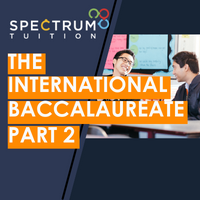Last time I posted, I gave some basic information on the IB diploma. Today, I will give a bit more specific information as to the nature of the course work in IB. Most importantly, I aim to give you an idea as to how the course differs to VCE, and what skills your child might need to develop in order to succeed in the IB diploma.
English:
Potentially the biggest difference between the VCE and IB courses is the content of the English program. In contrast to VCE English, which has only a minor focus on literature, the IB English program is heavily based around student’s abilities to comprehend and understand a range of familiar and unfamiliar works of poetry and prose.
Among the tasks that are demanded of IB English students, the most difficult involves students reading and analyse a previously unseen work of poetry and prose. This exercise is particularly difficult, as it requires students to apply their analytical skills in an unfamiliar context.
If you wish for your child to complete an IB diploma, I recommend that you begin to familiarise them with as many different types of literary texts as possible. You should encourage your child to read widely and to think carefully about what they are reading. Encourage your child to ask themselves the following questions as they read.
What is the author trying to make me think/feel?
How are they doing this?
Why did they choose that particular word over any other word?
What tone is the author using?
Does the author use any techniques such as onomatopoeia, assonance or alliteration is his or her writing? If so, why?
One of the best ways to learn how to analyse a text is through discussion. Try to talk to your child about what he or she is reading. Ask questions and have them explain the significance of particular passages. Or, if you think you may need help with this task, consider finding a tutor to help your child sort out their ideas.
Maths:
Just like in VCE, mathematics in the IB is split into 3 levels of difficulty: Studies Standard Level, Standard Level and High Level. Studies Standard level is quite similar to VCE’s Further Mathematics, as it is more focused on the application of mathematics to practical situations. In a similar sense, Standard Level is similar to Maths Methods and Higher Level is comparable to Specialist Maths. As of 2012, some schools will also offer Further Mathematics at Standard level.
When your child is choosing their maths subjects, there are some things that you might want to consider.
-Remember, there is no scaling in IB. A score of 7 in Maths Studies is worth exactly the same amount as a 7 in Specialist Maths. In some cases, it is preferable to study Standard level and get a high score, as oppose to study High Level and get a low score.
-High Level Mathematics can be quite challenging. Only students with a very high competency in maths should choose to do Mathematics as one of their high levels.
-Some University courses only accept applicants that have completed Maths Methods. In this case, completing Standard Level Maths will also satisfy this prerequisite. Make sure you check out the prerequisites for your child’s preferred university course before choosing subjects.
Hopefully, this information will put you and your child in a good position to make a very important decision: to do, or not to do, The International Baccalaureate. If you have any more questions, please feel free to leave them in the comments!


